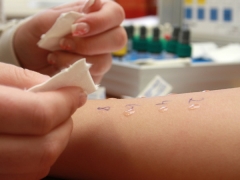Allergy tests for children and their types
Allergic tests are a qualitative and reliable method for the diagnosis of allergic reactions. They are based on the effect on the child's body of a stimulus to which he is allergic, after which the reaction is evaluated.
Kinds
The study can be presented as skin tests, and blood tests (immunological tests). All allergy tests are divided into:
- Straight lines - application of allergens to the skin of the child. At the same time on the skin do about two dozen scratches, which are injected allergens. According to the skin reaction that has appeared (reddening, peeling, edema of more than 2 mm in size), it is noted which allergen causes the allergy to the child. Such tests take some time, while the child is in the hospital and the medical staff constantly watches him.
- Provocative - these include inhalation, nasal, conjunctive studies. Such tests are prescribed in the presence of allergy clinic and inappropriate results of skin tests.
- Indirect - the child is injected subcutaneously with an irritant, after which a serum is injected that is sensitive to the allergen. The reaction will help assess the risk of an allergen to the baby.
Pros and cons of methods
Skin tests
A plus skin allergy test is the accuracy of the study, as well as its availability and simplicity.
The disadvantage of determining allergy through skin tests is a high risk of a negative reaction of the child’s body to the sample, therefore, the study is carried out only in a health facility. Also disadvantages can be called a longer examination time and painful procedure.
Allergy blood test
The advantages of blood tests for allergies include the following points:
- The study is highly accurate, since specific allergens are used.
- No direct contact with allergens.
- You can conduct an analysis at any time, including during exacerbations.
- To determine a significant amount of allergens, just one blood sampling is sufficient.
The disadvantage of blood tests to detect allergies is the high cost of this method.
Are there any contraindications?
Skin tests can not be done with:
- Significant damage to the skin;
- The use of antihistamine drugs, as a result of which the sensitivity of the skin will decrease;
- The risk of false-positive or false-negative results due to the increased sensitivity of the skin to a specific allergen;
- Predisposition to anaphylactic reactions (if cases of such reactions have already been);
- Children aged 3-5 years;
- Long-term treatment with corticosteroids;
- Acute infections;
- Exacerbations of allergies.
Blood tests for allergies are not done to infants, since maternal antibodies can be detected in their blood.
When are they tested?
Skin allergy tests are carried out only in the period of lasting remission. After the previous allergy exacerbation, at least 30 days should pass before the tests. Since it is impossible to predict the reaction of the child’s body to the sample, such tests should be performed only in a medical institution. But blood tests can be performed at any time during the development of the disease, but not in infancy.
What analysis to choose?
It is important to know that skin and indirect tests, as well as provocative, are not recommended for children under three years of age. Many allergists claim that with a smooth course of allergy, in the absence of serious manifestations, these types of samples should be done only at the age of over five years, since the baby’s body is able to naturally change reactions to many allergens.
Home Allergy Surveillance Tips
Parents can identify allergens in the child at home, watching the child's reaction to different products, contact with animals or other irritants. However, these will be only assumptions, and more reliable methods for determining allergens are tests in medical institutions.
Breastfeeding Allergies in the Breastfeeding
With regard to the prevention of the development of allergies, one of the important points is the nutrition of the woman during the carrying of the baby, as well as during the period of breastfeeding.
If the future or nursing mother will consume in excess of allergenic foods, it can cause sensitization in the child. That is why during pregnancy, as well as in the first months of breastfeeding in my mother's diet, products that are highly allergenic (chocolate, exotic fruits, nuts) are undesirable. Trying to enter them into the mother's diet should be very carefully, watching the reaction of the baby.







